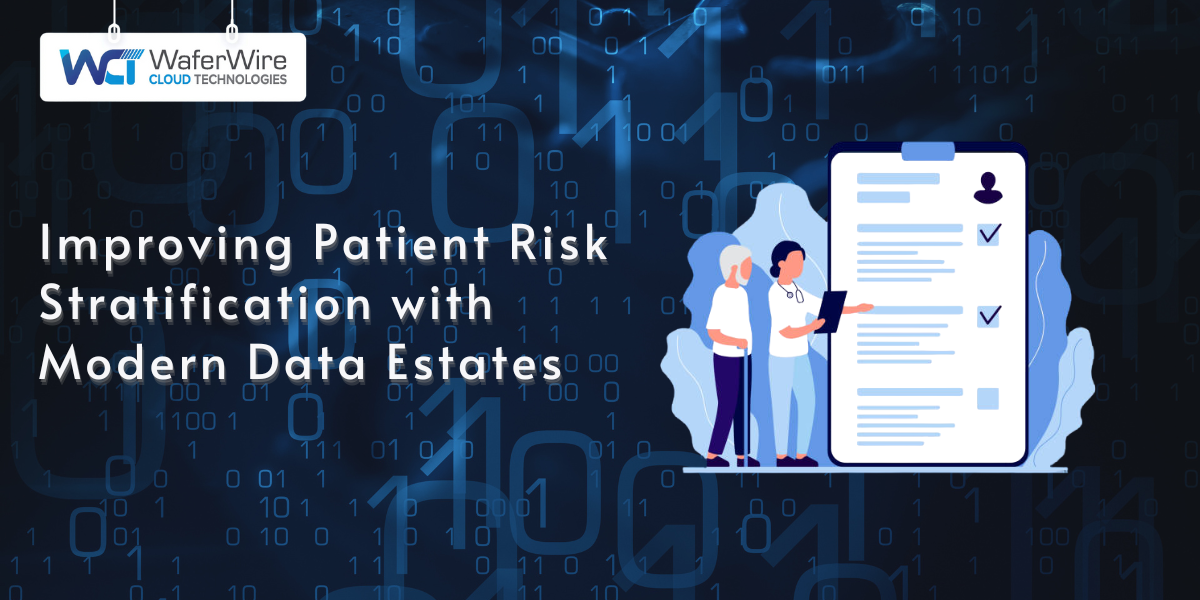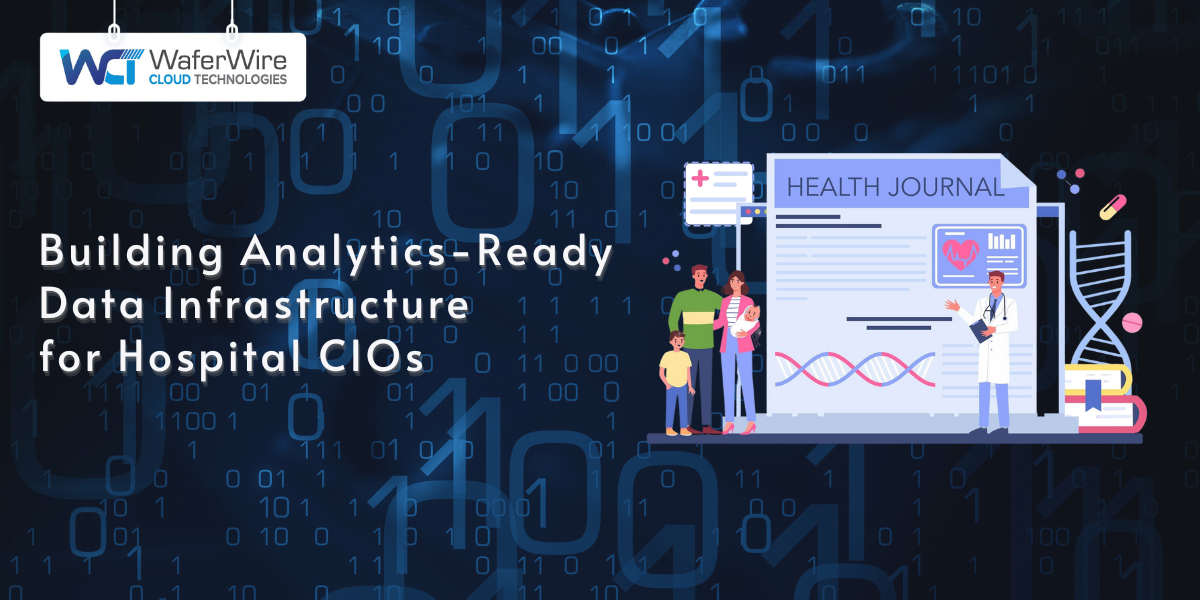
Top Data Governance Tools to Learn About
Mitra P
2025-03-24
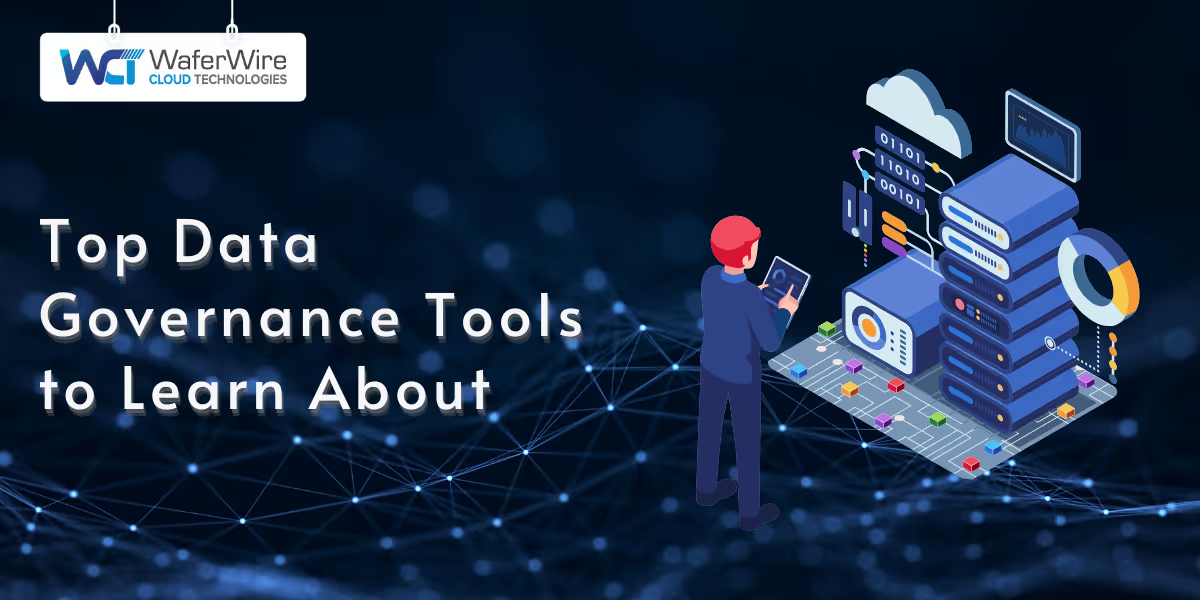
Talk to our cloud experts
Subject tags
Organizations generate vast amounts of data daily, but without proper governance, this data can quickly become a liability instead of an asset. Inconsistent policies, security gaps, and compliance failures can lead to operational inefficiencies and regulatory penalties.
To address these challenges, organizations rely on data governance tools that enforce policies, ensure data accuracy, and enhance security. This blog explores some of the top data governance tools that help businesses maintain control over their data and turn it into a strategic advantage. Let’s see some of the top data governance tools for your business.
What are Data Governance Tools?
Data governance tools are specialized software solutions that enable organizations to establish, enforce, and monitor policies for data quality, security, compliance, and accessibility. These tools help businesses standardize data management practices, ensure regulatory adherence, and maintain data integrity across various systems. By automating key governance processes, they reduce human intervention, minimize errors, and enhance overall data reliability.
Role of Data Governance Tools in Automating Governance Processes:
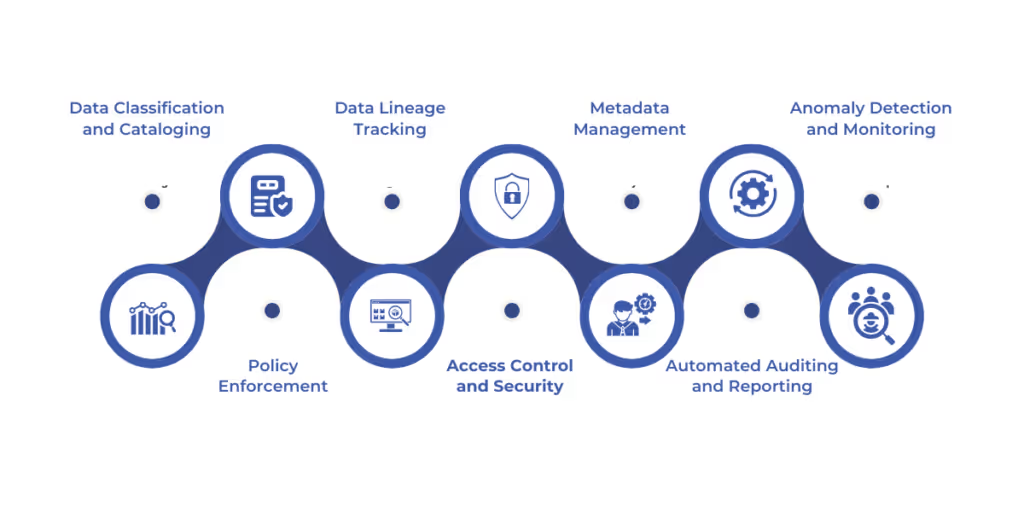
- Data Classification and Cataloging: Organize and categorize data for better visibility and access control.
- Policy Enforcement: Automate compliance with internal and regulatory policies to reduce human errors.
- Data Lineage Tracking: Maintain a record of data origins, transformations, and movements.
- Access Control and Security: Manage user permissions to prevent unauthorized access and data breaches.
- Metadata Management: Store and manage metadata for better data context and usability.
- Automated Auditing and Reporting: Generate compliance reports and audit logs for regulatory needs.
- Anomaly Detection and Monitoring: Identify inconsistencies, risks, or policy violations in real time.
By integrating these tools, businesses enhance efficiency, minimize risks, and maintain compliance. Next, let’s explore the benefits of modern data governance tools.
Benefits of Modern Data Governance Tools
Modern data governance tools streamline data management processes, ensuring accuracy, consistency, and protection across all operations. Here are some of the benefits of modern data governance tools:
Key Benefits
- Enhanced Data Quality: These tools identify and correct inconsistencies, duplicates, and errors to maintain accurate and reliable data.
- Regulatory Compliance: The tools automate adherence to industry regulations like GDPR, CCPA, and HIPAA to avoid legal penalties.
- Improved Security and Access Control: They protect sensitive data with role-based access management and encryption.
- Greater Operational Efficiency: They reduce manual data management efforts with automated workflows and governance policies.
- Better Decision-Making: The tools provide trusted, high-quality data for more informed business insights and strategic planning.
- Comprehensive Data Lineage Tracking: The tools ensure transparency by tracking data origins, transformations, and movements.
- Risk Mitigation: They detect anomalies and security threats in real time to prevent data breaches and fraud.
- Streamlined Collaboration: The tools foster cross-departmental collaboration by providing a unified data governance framework.
- Automated Auditing and Reporting: They generate real-time compliance reports and audit logs for internal and external reviews.
- Scalability and Flexibility: The tools adapt to growing data needs with cloud-based and AI-powered governance solutions.
By implementing modern data governance tools, organizations can secure their data assets while driving operational efficiency. To get all these advantages, you need to select an effective governance tool! So, now we will have a look at some of the best data governance tools available in the market!
10 Best Data Governance Tools
Getting access to a good quality data governance tool is important to maintain data accuracy, security, and compliance while streamlining governance processes. Here are some of the top data governance tools:
1. Alation

Alation is a data intelligence platform that integrates AI-driven data cataloging, policy enforcement, and collaborative governance. It enables organizations to automate metadata management, track data lineage, and ensure regulatory compliance. Alation’s active data governance feature continuously monitors and updates policies, helping businesses maintain data integrity and security across distributed environments.
Key features
- Active data governance with automated policy enforcement that directly integrates with query tools to prevent policy violations before they occur
- Behavioral analysis engine that learns from user query patterns to identify sensitive data usage and recommend appropriate governance controls
- Automated data stewardship recommendations that use machine learning to suggest the most qualified individuals for specific data domains
- Automated impact analysis that traces upstream/downstream dependencies for compliance risk assessment when data policies change
- Configurable certification workflows with expiration dates and automated recertification triggers for data assets to maintain governance currency
Pros
> AI-driven automation
> Strong collaboration features
> Real-time policy updatesCons
> Initial setup can be complex
2. Collibra
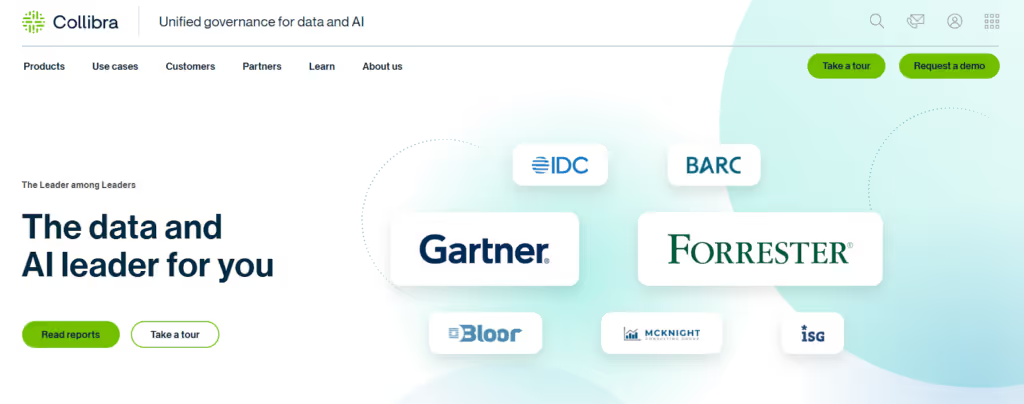
Collibra provides a centralized governance framework for data cataloging, quality monitoring, and compliance management. It offers automated workflows for data stewardship, helping organizations enforce policies and maintain regulatory compliance. Collibra also supports cross-platform data integration, ensuring seamless governance across cloud and on-premise environments.
Key features
- Operating model framework with configurable data governance roles, responsibilities, and accountability matrices mapped to enterprise structures
- Policy-driven automated data classification that assigns governance requirements based on detected patterns and content within datasets
- Business process-oriented lineage that maps data flows to specific business processes for regulatory compliance documentation
- Automated data issue management with escalation workflows, SLA tracking, and governance impact scoring
- Reference data management with governance controls for creating, approving and versioning reference data sets within compliance frameworks
Pros
> User-friendly interface
> Strong policy enforcement
> Scalable for enterprisesCons
> High learning curveLimited flexibility
3. Erwin Data Intelligence
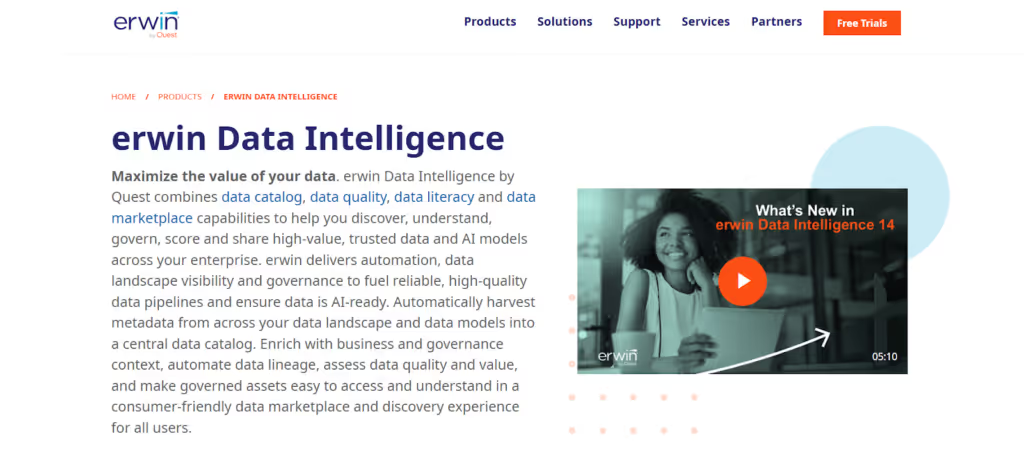
Erwin combines data lineage tracking, metadata management, and automated governance workflows to improve data quality and compliance. It provides deep insights into data assets and integrates with major cloud platforms. The tool supports sensitive data discovery, helping businesses identify and protect critical information while ensuring transparency.
Key features
- Business process modeling with integrated data lineage that maps regulatory requirements directly to operational processes and data flows
- Automated data harvesting with pattern recognition to identify and classify PII across diverse data sources based on configurable governance rules
- Impact analysis visualization that provides multi-dimensional views of how metadata changes affect compliance requirements across systems
- Configurable data quality scorecards with governance thresholds that trigger automated workflow approvals when scores fall below specified levels
- Role-based governance dashboards that dynamically adjust compliance metrics based on a user's governance responsibilities and authority level
Pros
> Strong data lineage tracking
> Automated workflows
> Compliance-focused features.Cons
> UI could be more intuitive
> Requires technical expertise
4. Informatica Cloud Data Governance and Catalog
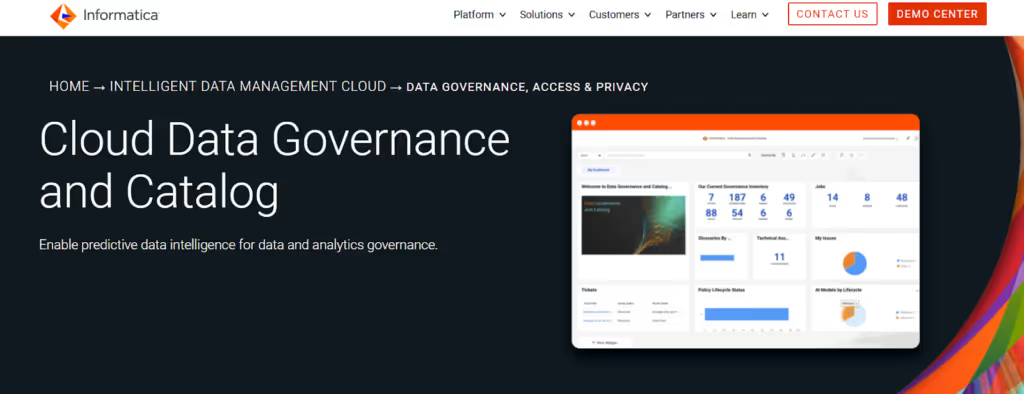
This cloud-based solution offers automated data discovery, quality assessment, and compliance tracking. Informatica provides real-time monitoring, helping organizations maintain governance across distributed data environments. It also features AI-powered metadata management, allowing businesses to map relationships between datasets for improved visibility and control.
Key features
- AI-powered data domain discovery that automatically identifies and categorizes data domains for governance alignment without manual tagging
- Automated policy enforcement with data access controls that integrate directly with cloud service provider security mechanisms
- Data risk scoring based on sensitivity classification, usage patterns, and protection controls to prioritize governance resources
- Natural language policy authoring that converts written regulatory requirements into executable governance rules and controls
- Governance-aware data provisioning that automatically applies masking, tokenization, or anonymization based on user role and purpose
Pros
> AI-driven insights
> Scalable cloud integration
> Real-time governance trackingCons
> Complex setup
5. Oracle Enterprise Data Management
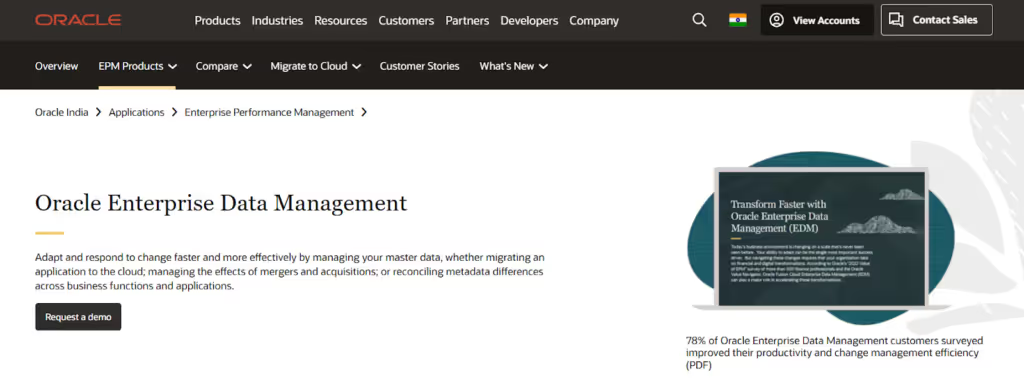
Oracle’s solution focuses on enterprise-wide data governance, hierarchy management, and access control. It supports multi-cloud integration and ensures data consistency across financial, operational, and analytical platforms. With automated validation rules, businesses can enforce governance policies with minimal manual intervention.
Key features
- Hierarchical data governance model that enforces parent-child relationships between policies, enabling cascading compliance requirements across data domains
- Change approval workflows with conditional routing based on data classification and impact analysis results to ensure proper governance review
- Version-controlled data models with regulatory mapping that tracks which compliance requirements are satisfied by specific data structures
- Automated reconciliation of governance metadata across multiple enterprise systems to identify and resolve policy enforcement gaps
- Governance-driven data validation rules that automatically generate quality checks based on regulatory requirements and business policies
Pros
> Strong enterprise support
> Multi-cloud compatibility
> Automated policy enforcementCons
>Requires Oracle ecosystem to implement
6. DataGalaxy
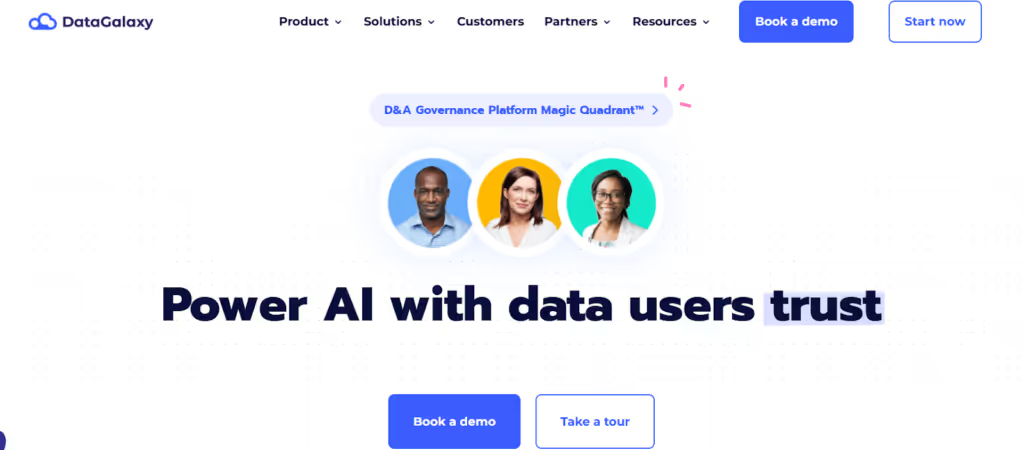
DataGalaxy provides real-time data cataloging, governance automation, and policy monitoring in a collaborative environment. It allows businesses to map data relationships, track usage, and ensure regulatory compliance. The tool’s interactive dashboards offer a clear view of governance policies, helping organizations make data-driven decisions efficiently.
Key features
- Collaborative data governance workspace with role-based contribution rights that maintain audit trails of all governance decision-making
- Machine learning-based data usage pattern analysis to identify undocumented governance requirements and recommend policy updates
- Visual data lineage with embedded governance requirements that show policy enforcement points throughout the data flow
- Automated regulatory compliance reporting that maps data assets to specific regulatory frameworks with evidence of control implementation
- Knowledge graph-based impact analysis that identifies governance implications across interconnected data assets when policies change
Pros
> Real-time policy tracking
> User-friendly dashboards
> Strong collaboration featuresCons
> Limited integrations
> Slightly steep learning curve
7. Apache Atlas
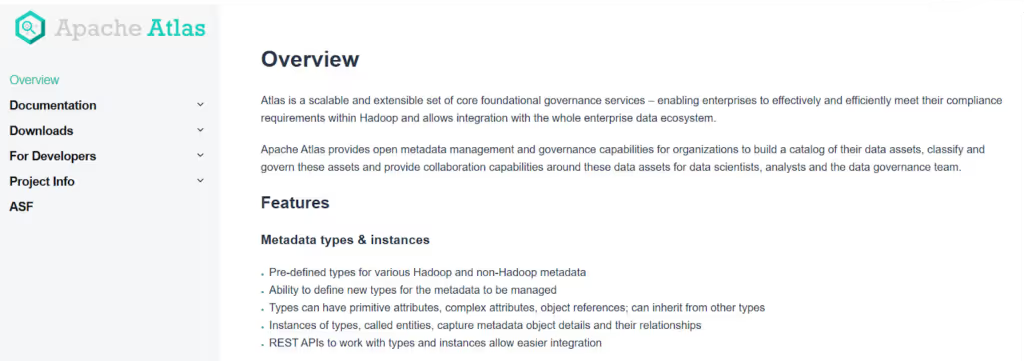
Apache Atlas is an open-source data governance framework designed for metadata management, data lineage tracking, and classification. It integrates seamlessly with big data platforms like Apache Hadoop and provides granular access control for sensitive data. Its flexible APIs enable developers to customize governance workflows.
Key features
- Open metadata type system with extensible models for custom governance taxonomies that integrate with Hadoop security frameworks
- Automated metadata tagging through configurable classification propagation rules that enforce governance across data pipelines
- Governance-focused audit repository that captures data access patterns with HDFS permission changes for compliance reporting
- Real-time metadata change notifications that trigger policy enforcement workflows through Apache Kafka integration
- Recursive data classification inheritance that automatically applies governance controls to derivative datasets based on source classifications
Pros
> Open-source
> Strong big data support
> Flexible customization optionsCons
>Limited user-friendly UI
> Requires technical expertise
8. Ataccama One

Ataccama One combines data quality management, governance automation, and AI-driven insights into a single platform. It supports self-service governance, allowing non-technical users to manage and classify data effectively. Its real-time data profiling feature ensures continuous monitoring and policy compliance.
Key features:
- AI-powered metadata discovery with governance rule suggestions based on detected data patterns and regulatory requirements
- Data stewardship workflows with task prioritization algorithms that focus governance efforts on highest-risk assets first
- Automated data privacy impact assessments that evaluate governance risks when data processing activities change
- Rule-based data tokenization that applies appropriate masking techniques based on governance classification and user authorization
- Self-service governance request portal with approval workflows for temporary policy exceptions with full audit tracking
Pros
> AI-powered automation
> Real-time monitoring
> Intuitive for non-technical usersCons
>Requires training for advanced features
9. IBM Cloud Pak

IBM Cloud Pak is a comprehensive data governance and AI-driven analytics platform. It offers metadata-driven insights, risk assessment, and automated policy enforcement. Businesses can use pre-built governance templates to streamline compliance efforts and enhance security across hybrid cloud environments.
Key features:
- Automated policy enforcement with runtime data protection that integrates governance rules directly into data access layers
- AI-powered sensitive data discovery that identifies undocumented PII across structured and unstructured sources with custom pattern recognition
- Governance-aware data virtualization that applies appropriate controls based on user context without physically moving data
- Dynamic data risk scoring that continuously evaluates governance compliance based on changing usage patterns and control effectiveness
- Regulatory rule mapping that links specific data elements to compliance requirements with evidence collection for audit readiness
Pros
> Strong AI capabilities
> Scalable cloud integration
> Built-in compliance toolsCons
>Requires IBM ecosystem for full functionality
10. OneTrust Data Discovery and Classification
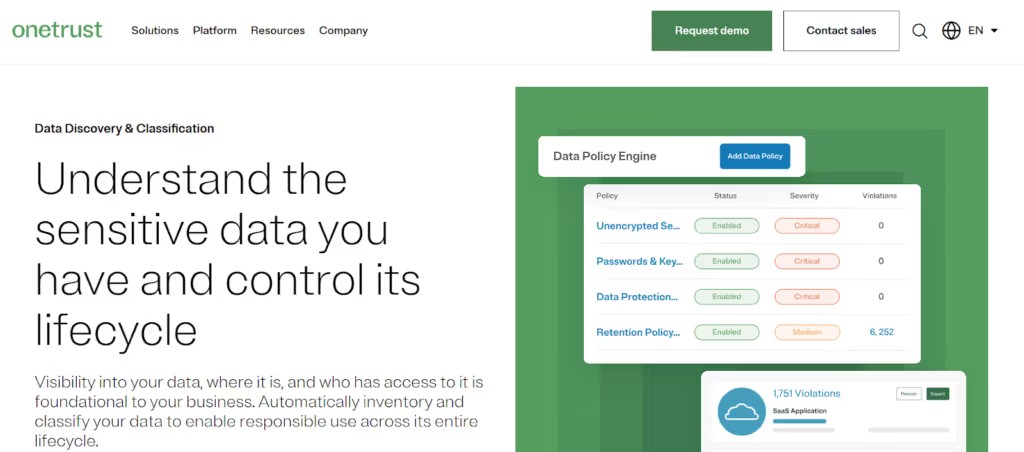
OneTrust specializes in data discovery, classification, and regulatory compliance. It helps businesses identify sensitive data, enforce privacy policies, and meet GDPR and CCPA requirements. With automated risk assessments, organizations can proactively mitigate governance risks.
Key features:
- Automated data subject rights fulfillment with governance-based workflows that ensure proper approvals before data disclosure
- Purpose-based data governance that restricts processing activities based on the original consent parameters and regulatory requirements
- Regulatory intelligence engine that updates governance controls automatically when privacy laws change across jurisdictions
- Data minimization automation that identifies and flags redundant data storage based on governance retention policies
- Cross-border data transfer impact assessments with automated governance controls implementation for international compliance
Pros
> Strong privacy compliance
> Automated risk assessment
> Intuitive UICons
>Requires ongoing customization
Selecting the right data governance tool depends on your specific needs, from regulatory compliance to metadata management. Now that we have some top options, it is time to look at some criteria to choose the right one among those tools.
Factors to Consider When Choosing Data Governance Tools
Selecting the right data governance tool is essential for ensuring data quality, security, and compliance. Below are key factors to consider:
- Regulatory Compliance Support: Ensure the tool complies with regulations like GDPR, CCPA, HIPAA, and industry-specific standards to avoid legal risks and penalties.
- Metadata Management Capabilities: Look for advanced metadata cataloging, lineage tracking, and automated classification to improve data visibility and accuracy.
- Scalability and Flexibility: Choose a solution that can scale with your organization’s growing data needs and adapt to hybrid or multi-cloud environments.
- Automation and AI Features: Opt for tools that offer AI-driven governance, anomaly detection, and automated policy enforcement to reduce manual effort and errors.
- User-Friendliness and Accessibility: Ensure the platform provides an intuitive interface and self-service options for both technical and non-technical users.
- Data Security and Access Controls: Verify the tool includes role-based access controls, encryption, and monitoring to protect sensitive information.
- Cost and Licensing Model: Assess the pricing structure, subscription plans, and total cost of ownership to align with budget constraints.
A well-chosen data governance tool enhances data security, compliance, and efficiency. Evaluating tools based on these factors ensures a strategic investment that supports long-term business goals and data-driven decision-making.
Conclusion
Effective data governance tools help you maintain structured data management, reducing risks associated with poor governance. Additionally, these tools enable faster decision-making by providing high-quality, well-organized data for analysis, leading to better business insights and strategic growth opportunities.
As data-driven operations continue to expand, organizations must adopt robust governance solutions to maintain a competitive edge. By implementing the right tools, you can streamline governance, enhance efficiency, and unlock new opportunities for long-term success in an increasingly digital landscape.
Here at WaferWire, we believe that in a data-driven landscape, the integrity and security of your data are paramount. Our Data Governance & Compliance services empower you to effectively manage your data assets, ensuring compliance with industry regulations while minimizing the risks of breaches and inaccuracies. Contact us today to establish a robust governance framework that secures your data.
Subscribe to Our Newsletter
Get instant updates in your email without missing any news
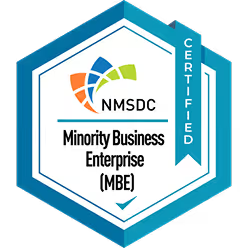
Copyright © 2025 WaferWire Cloud Technologies




.png)








